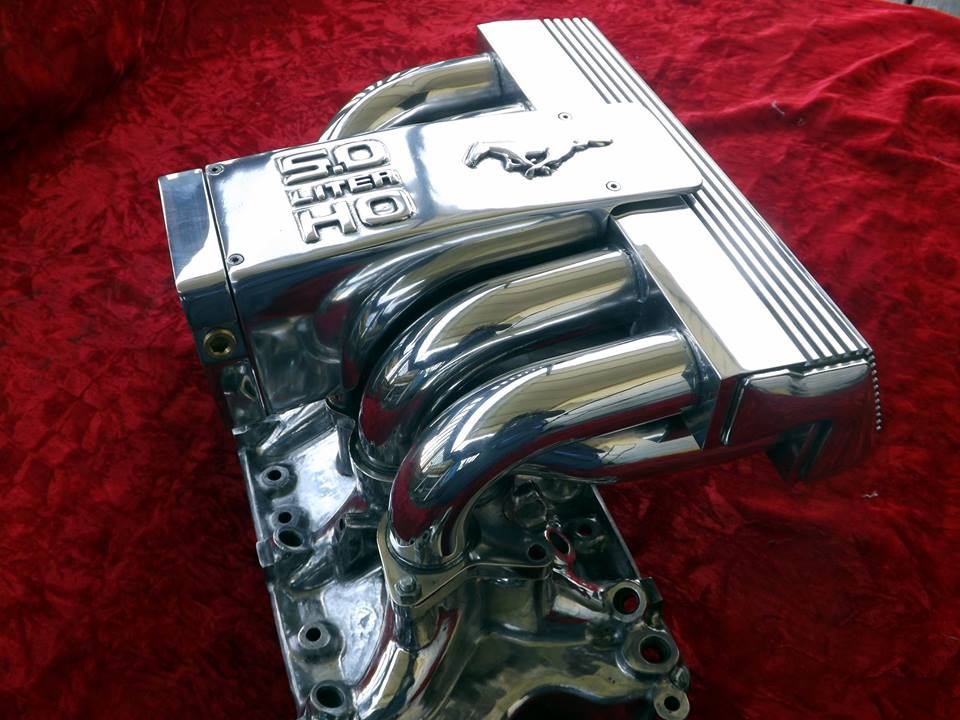Words: Ted Jenkins
Editing: Darren Lynch
Tech: Tony Brooks
UPDATED 7 November 2020
They say there is nothing new under the sun, but under hood, there is always development and discovery.
It is a well-known fact that the OE EFI intake manifold found on the venerable 5.0L Windsor was a serious development over the previous carbureted pieces of pre-1986 cars. Its long, relatively narrow runners combined with a tuned plenum volume worked to developed monster torque but left some Mustangers feeling a bit underwhelmed in the upper revs.
Once the OE E7TE cylinder heads are replaced with high flow pieces, this torque biased intake’s breathing problems become even more exaggerated. Before long the performance aftermarket stepped in to develop better breathing options. With far less fanfare than the heavily advertised Aftermarket pieces, Ford Motor Company began on its own path of performance improved intakes. In the late 1980’s Mustang owners could get the tubular GT40 intake or by ’93 could opt for the more conventional cast version as found on the SVT Cobra. This SVT Cobra piece went on to more common and mundane duty powering the 1996+ Ford Explorer 5.0L

How good were each of these intakes and can they be ported for improved flow?
To answer this question, it was a matter of reaching out to Tony Brooks of Big Dogs porting and strapping each manifold to his flowbench calibrated to Superflow 600 specifications.
The Baseline was established by the stocker 5.0L EFI manifold at 135-140 Cubic feet per minute (CFM) with the Expy/Cobra/GT40 running 195-205 CFM.
Next up were the tried and true offerings from Edelbrock. The Performer came in at 230-240 CFM, the Performer RPM at 240-250 CFM, and the short runner Victor 5.0 275-285 CFM. Tony observed that the Victor’s flow was limited by a narrow throat.

The next batch of off the shelf designs featured offerings from Trick Flow Specialties (TFS) and Holley. The TFS Track Heat came in at 245-255 CFM while the Holley SysteMax lagged slightly behind with 245-250. Tony observed a similar narrow throat limitation in the Holley as he did with the Victor.

With baselines established, the real work began to unfold with porting the Expy/Cobra/GT40 series for additional flow and power.
Before setting to work, Tony noted the Explorer and Cobra have a very high potential flow after porting. The GT40 tubular also rates high but the upper intake doesn’t allow for much port work and shortening of the runners, so it is limited compared to the Cobra and Explorer pieces.

After a Bigdogs Stage 2 port, which results in an average runner length of 14.53” and a cross-sectional area of 2.4 square inches, the GT40 Explorer/Cobra flows a fantastic 290-300 CFM. This ported manifold and shortened runner length is good to 6500 RPMs.

The Bigdogs Stage 3 port takes things even further, allowing the GT40 Explorer/Cobra flow 320 CFM and beyond. This will produce power all the way up to 7500 RPM for those of you that want to build a high RPM screamer of a small block Ford.

Can you do this at home?
While there is power in the basic porting of stock pieces it would take a lot of trial, error, and testing to get anywhere near this. Make no mistake this type of port work takes hundreds of hours of flow bench testing and data collection. Port templates and micrometers are required as well as proven specs. Just removing as much material as possible is not how port work is done. Many areas would benefit from adding material.
If you would like better than aftermarket performance in the stealthy package of OEM castings, visit https://www.facebook.com/bigdogsporting/ and have Tony Brooks work his magic. If you come across a modded 5.0L with a suspiciously OE manifold, watch out, there may be a deceptively quick engine being fed by that old grey casting!

Links:
Like to know more?
https://www.facebook.com/bigdogsporting/

Hay Tony I have a 1995 cobra intake. I had my lower intake ported by Tmoss. the upper wasn’t touched. I think I’m leaving power on the table. I have a steeda #18 cam and 165 AFR heads. how much to port my upper to match my set up?
Very interesting…I have a 94GT with a 95 Cobra intake waiting to be worked on & would like to know which AFR heads to match it with….& cam.